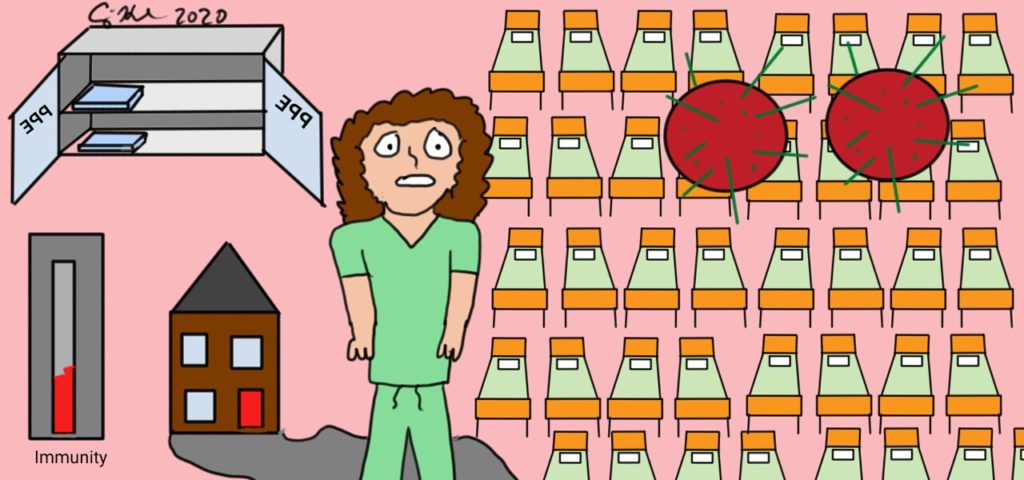by Nicki Reno-Welt, PA-C, MSHS, MFA
I am distraught about Covid-19. But not just for all the valid reasons we hear about on the news.
I am a 45-year-old, licensed, board-certified physician assistant. I have spent my entire career working with the underserved. I have studied bioethics and health care rationing in times of catastrophe. I am a professor in a PA program dedicated to teaching students to care for the underserved. In hindsight, my entire life has been preparatory work for this pandemic. I am the perfect person to combat this virus on the front lines of the most vulnerable. There’s just one problem: I’m immunocompromised.
When I learned about catastrophe medicine, I recall focusing on war or natural disaster scenarios, like the war in Syria or Hurricane Katrina. I had visions of packing up and heading to Sudan or some other place to help the people who seemed to need it the most. Maybe chemical warfare was brought up once or twice but I don’t remember ever talking about a “medical catastrophe” involving a virus at home.

Most people who enter medicine want to help other people. We want to help them so much, in fact, that we sacrifice absurd amounts of time and money to achieve this end. No one enters medicine on a whim – it’s a well thought out, highly planned choice. We know what we are getting into. We know the risks. We actually get a little excited thinking about jumping in and helping people in dire straits.
Now, though, I’m not sure what to do. I hear about the clinicians without enough personal protective equipment to keep them. I hear about clinicians coming into work on their days off to help with the patient load. Should I be doing this, too? Is being immunocompromised a good enough reason to not be on the front lines? Or a reason at all?
I have Lupus and am currently on three different immunosuppressant medications: Imuran (azathioprine), Benlysta (belimumab) and prednisone. Lupus is a real disease that kills people too – and these medications are what help me stay alive. All the experts tell us “immunocompromised” to expect the worst with Covid-19 because we are the ones who are dying the most (along with the elderly).
The University where I teach has pulled students out of their clinical rotations (along with most other schools) for now, citing “safety” reasons. Also, there is limited Personal Protective Equipment (PPE) for health care providers and no one wants a less-trained student using it up just to watch. I get it.
However, we are also short health care workers. Frantic calls are being made to reinstate retired clinicians, specialists, nurses. Some countries are accelerating graduation for senior medical students in an effort to boost their clinical work force. I get calls and emails every day from recruiters desperately searching for providers to enlist during this pandemic. I just received an email begging PAs to come work the drive-through testing sites – and they are paying up to $150 an hour.
This only makes me feel worse. People are dying and I am trained to help. But I’m not helping. I’m at home, fastidiously washing my hands, trying to teach my students online, and doing administrative clinical work. I wish I was friends with Harvard philosophy professor Michael Sandel so I could call him up and ask him, “What’s the right thing to do?”
There’s also the problem of the other people in my life who are insisting that I stay home. What about them? Do I disregard their opinions (and their health) and just go out and help anyway?
I’ve tried applying utilitarianism to this dilemma (which is the same theory being used in Italy to determine who gets ICU beds and ventilators and who doesn’t). This theory holds that actions are right if they benefit the greatest number of people. Another part of this theory is that we should act to cause the least harm (pain).
I’ve trained applying the “airplane mask” theory, as well. On the plant, the flight attendants tell you to put your own oxygen mask on first, then help others – because you can’t help anyone if you’re dead or unconscious.
I’ve tried applying Kant’s deontology. The maxim that a trained health care provider should be helping people in need is a universal duty. Even J.B. Pritzker, Governor of Illinois mandated that health care providers report to work to help the sick.
In applying these theories to my own situation, it seems I would help the most people by staying home now. I would help more patients over the course of my remaining career, I will be able to help the now displaced students to continue their learning (and exponentially the future patients they will treat), than I would help in this short term. I will prevent the pain of possibly infecting my family, and of being a burden to those same strained health care providers possibly having to take care of me who is particularly vulnerable to this infection. Yes. I should definitely stay home. Except, I think about all those retired clinicians who are heeding the call. Sometimes there are simply no right answers, just virtuous people trying to make good decisions in impossible circumstances. I still ask, what would Dr. Sandel do?